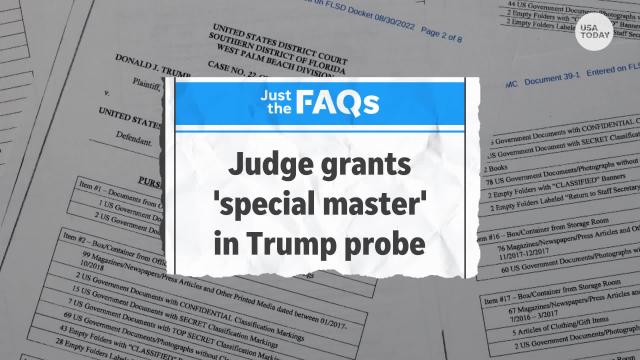Judge names Raymond Dearie special master to review Mar-a-Lago documents but keeps pause on DOJ investigation of Donald Trump

A federal judge late Thursday appointed Raymond Dearie, a former chief federal judge in Brooklyn who also served on the Foreign Intelligence Surveillance Court, to be the special master reviewing the documents seized at former President Donald Trump’s Florida estate.
But U.S. District Judge Aileen Cannon refused to lift her temporary prohibition on the Justice Department reviewing the documents for its criminal investigation. The department has appealed that part of her ruling.
Cannon appointed Dearie at Trump’s request for an independent review of thousands of documents seized at Mar-a-Lago, including dozens marked "secret" or "top secret."
Cannon ordered Trump to pay 100% of the costs for the review. She also granted access to all of the documents, including the classified records, under controlled access conditions.
The Justice Department, which had opposed a special master as unnecessary, accepted Dearie because of his experience in national security cases and with questions of attorney-client privilege.
But Cannon would not allow the Justice Department to continue its review of about 100 classified documents while the special master does his review. The FBI had searched Mar-a-Lago on Aug. 8 for evidence of mishandling national defense documents under the Espionage Act or obstruction of justice.

“Indeed, if the Court were willing to accept the Government’s representations that select portions of the seized materials are – without exception – government property not subject to any privileges, and did not think a special master would serve a meaningful purpose, the Court would have denied Plaintiff’s special master request,” Cannon wrote.
Prosecutors had argued their criminal review is urgent because the documents contain national security secrets. But Cannon said she wasn’t persuaded to handle the documents piecemeal or to trust the government’s characterization of the records.
“First, there has been no actual suggestion by the Government of any identifiable emergency or imminent disclosure of classified information arising from Plaintiff’s allegedly unlawful retention of the seized property,” Cannon wrote.
The government appealed the part of her decision that pauses their investigation to the 11th U.S. Circuit Court of Appeals.
FBI agents found 11,000 documents, including 54 marked “secret” and 18 “top secret.” Another 48 empty folders had “classified banners,” and 42 folders were marked with “return to staff secretary/military aide.”
Trump's lawyers argued there was “no indication any purported ‘classified records’ were disclosed to anyone” and said the Secret Service guarded Mar-a-Lago.
But former national security officials told USA TODAY the categories of highly sensitive documents found at Mar-a-Lago would typically be read only in secure rooms authorized by the government and then locked in a safe. Federal authorities said there were no government-authorized rooms for classified documents at Mar-a-Lago.
Trump’s lawyers have argued that the search swept up communications between him and lawyers that investigators shouldn’t have access to under attorney-client privilege. The government identified 520 pages that fall under possible privilege. Cannon ruled that an independent review by a special master would provide greater fairness to Trump.
Dearie is a senior district judge in the Eastern District of New York, which comprises Brooklyn, Queens and Long Island. Dearie was nominated to the court by President Ronald Reagan in 1986 after serving four years as U.S. attorney in the district.
This article originally appeared on USA TODAY: Dearie becomes Mar-a-Lago records special master in pause of DOJ probe
Solve the daily Crossword

